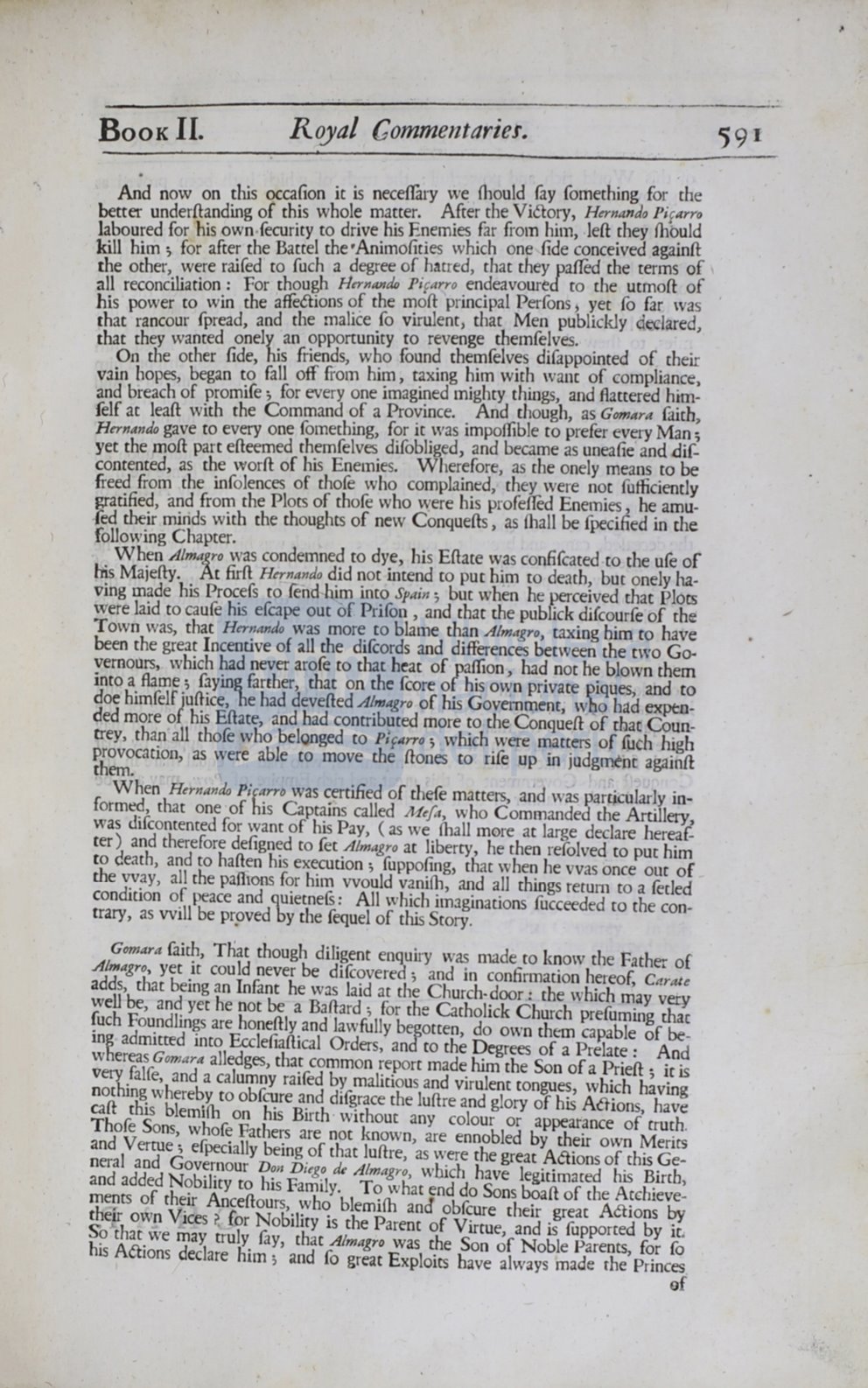

BooK
II.
Royal
Commentarie!.
~d
now on
this
occafion
it
is
nece£fary
w~
£hould .fay forneching for. che
better underfianding of this whole mateer. After the V1etO!)',
Hernando P1pirYo
laboured
for his
own fecurity to drive
his
Enemies _far from hun, lefi
~hey
ilio_uld
kill him ;
for after the Battel the•Animofities which one fide conceived agamfi
the ocher were raifed
to
fuch a degree of hatred, that theyjaffed the terms of
all
recon~iliation
: For though
Hernando
Pifarro
.
en9eavoure
to the utmofi of
his power co win the affeetions of the mofi pnnc1pal Perfons, yet fo far was
that rancour fpread, and the malice
_fo
virulent, that Men
publickly
declared,
that they wanted onely an ?PPOrtumty
to
revenge chemfe!ves.
.
.
On the other fide his fnends, who found themfelves difappomted of their
vain hopes, began
t~
fall
off from
hi~
,
t~xing ~im wit~
wane of
complia~ce,
and breach of promife ; for every one
1mag~ed
mighty things, and flattered
h~felf at leafr with the Command of a Province. And though, as
Gomara
fauh>
Hernando
gave to every one fornetbing, for it \.Vas impoffible to prefer every Man ;
yet the mofi part efieemed rhemfelves difobliged, and became as uneafie and dif–
contented as the worft of his Enemies. Wherefore, as rhe onely means to be
freed
fro~
the infolences of thofe who complained, chey were nor fufficiendy
gratified, and from the Plots of thofe who were his profeffed
Enemi~
,
h~
amu–
.fed
their
minds with the thoughts of new Conquefis, as £hall be fpecified m the
following Chapter.
When
Almagro
was condemned to dye, his Efiate was confifcated
to
the ufe of
his
Majefty.
At
firfi
Hernando
did not intend
to
puc him
to
death, but onely
ha–
ving made his Procefs
to
fen~im
into
Spain;
but when he perceived that Plots
were laid to caufe his efcape out of Prifon , and that the publick dilcourfe of the
Town was, that
Hernando
was
more to blame than
Almagro,
taxing him to have
been the great Incentive of all the difcords and differences between the two Go–
vemours, which had never arofe to that heat of paffion,
had
not he blown chem
into a flame; faying fareher, that on the fcore of his own private piques, and to
doe himfelf julHce, he had devefied
Almagro
of
his
Government, who had expen–
ded more of his Eftate, and had contributed more to the Conquefi of chat Coun–
ttey,
than
all
thofe who belonged to
Pifarro;
which were matters of
fuch
high
provocation, as were able to move che fiones to rife up
in
judgment againft
them.
When
Hernando Pif
arrl>
was certified of thefe matters, and
was
particularly in–
formed,
that
one of
his
Captains called
Mefa,
who Commanded the Artillery,
was difcomented
for
want of his Pay,
(as
we
{hall
more at large declare hereaf–
ter) and therefore defigned
to
fet
Almagro
at liberty, he then refolved to pur him
co death, and to
hafi~n
his execution ; fuppofing, that ' hen he vas once out of
the vvay, all the paffions for him vvould vanifh, and all things remm
to
a fecled
condition of peace and quietneCS:
All
which imaginations fucceeded
to
the con–
trary,
as
vvill be
prpved by the fequel of this Story.
Gomara
faith,
That though diligent enquiry
as
made to know the Father of
Almagro,
yet ic could never be difcovered; and in confirmation hereof,
Carate
adds, that being an Infant he was laid
at
the Church-door: the which
may
vezy
well be,
and
yet
he not be a Ballard ; for
the
Catholick Church prefuming thac
fuch Foundlings are honeftly and lawfully begotten, do own them caP.able of be–
ing
admitted into Eccleftafiical Orders, and to the
Degrees
of a Prelate: And
whereas
Gomara
alledges, that common report made
hirri
the Son of
a
Priefl: ·
ic
is
'7ery _falfe, and
a
calumny raifed by malicious and virulent
con~es,
which
h~ving
nothin& whereby to obfcure and difgrace the lufire and glory of his Attions
have
caft
tfos
blemifh on his Birth without any colour or
ap~arance
of cruth.
Thofe Sons, whofe Fathers are not known, are ennobled by their own
Merits
and Verrue ; efpecially being of that lufire,
as
were the great Aetions
of
this
Ge–
neral and
Gov~~nour
D?n
Dieg~
de Almagro,
which have legitimated his Birth,
and added N<?b1hty to hIS
Family.
To what end do Sons
boaft
of the
AtE:hieve–
ments of
th~1r
Ancefiours,.
~h~
blemifh and obfcure their great Atl:ions by
thetr own Vices? for Nob1hry is the Parent of Virtue, and
is
fupported by
i
S~
that. we may truly
fay,
that
AlmagrtJ
was the Son of Noble Parents, for
fo
hIS
Athens declare him; and fo great Exploits
have always
made the Princes
0
59
1














